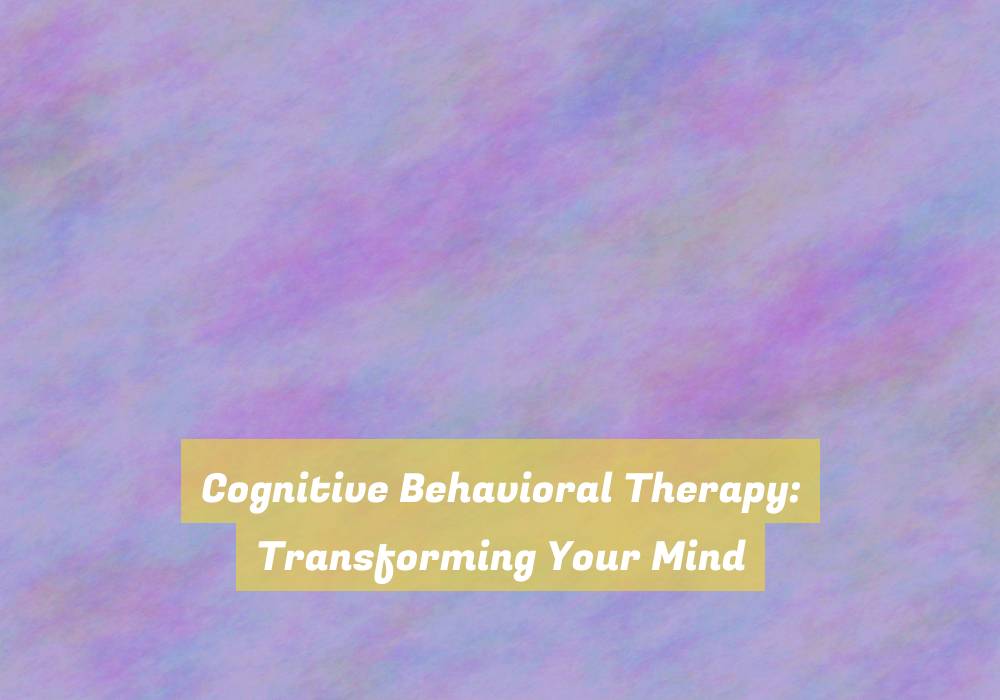Cognitive Behavioral Therapy: Transforming Your Mind
You know that feeling of constantly worrying about the future or dwelling on past mistakes? Cognitive Behavioral Therapy (CBT) offers a proven way to break free from these cycles of negative thinking.
By understanding the core principles of CBT and learning how to apply its techniques, you can transform your mind and improve your overall well-being.
But how exactly does CBT work, and what are the benefits of this approach?
Understanding Cognitive Behavioral Therapy
Cognitive Behavioral Therapy, often referred to as CBT, is a widely-used psychotherapeutic approach that focuses on identifying and changing negative thought patterns and behaviors. It operates on the principle that our thoughts, feelings, and behaviors are interconnected.
In CBT, youG??ll work with a therapist to pinpoint the negative thought patterns that contribute to your emotional distress or problematic behaviors. By becoming more aware of these patterns, you can start to challenge and change them.
CBT operates on the belief that changing your thoughts can lead to changes in your emotions and behaviors. YouG??ll learn strategies to replace negative thought patterns with more realistic and positive ones. Through this process, youG??ll develop coping skills to deal with challenging situations in a more effective way. CBT is structured and goal-oriented, providing you with practical tools to apply in your daily life.
As you engage in CBT, youG??ll actively participate in setting goals and homework assignments to practice the skills you learn during therapy sessions. This active involvement empowers you to take charge of your mental well-being and actively work towards transforming your thought patterns and behaviors.
Core Principles of CBT
Now that you understand the fundamentals of Cognitive Behavioral Therapy and its focus on identifying and changing negative thought patterns and behaviors, letG??s delve into the core principles that underpin this transformative approach.
The first core principle of CBT is the collaboration between you and your therapist. This collaborative relationship fosters trust and empowers you to actively participate in your own healing process.
Secondly, CBT is present-focused, meaning that it prioritizes dealing with current issues rather than delving extensively into past events. This allows for practical and immediate solutions to be developed.
Another key principle is the emphasis on structured sessions and homework assignments. These help to reinforce the learning and skills acquired during therapy sessions.
Additionally, CBT is based on the concept that thoughts, feelings, and behaviors are interconnected, and changing one can lead to changes in the others.
Finally, CBT is goal-oriented, with specific and measurable objectives set at the beginning of therapy. This ensures that progress can be tracked and celebrated, providing motivation for further growth.
These core principles form the foundation of CBT and guide the transformative process of reshaping negative thought patterns and behaviors.
Applying CBT Techniques
To effectively apply CBT techniques, youG??ll need to actively engage in identifying and challenging negative thought patterns and behaviors. One of the key techniques is cognitive restructuring, which involves recognizing negative thought patterns and replacing them with more realistic and positive thoughts. This process requires you to pay close attention to your thoughts and actively challenge any distortions or irrational beliefs.
Another important technique is behavioral activation, where youG??ll learn to identify and engage in activities that bring you joy and a sense of accomplishment, even when you may not feel like doing them at first. This helps to counteract feelings of depression and low motivation.
Additionally, youG??ll be encouraged to practice mindfulness, which involves staying present in the moment and observing your thoughts without judgment. This can help you become more aware of your automatic thought patterns and better equipped to challenge and change them.
Benefits of CBT
With cognitive behavioral therapy (CBT), you can experience a notable improvement in your mental well-being and coping strategies. One of the key benefits of CBT is its focus on providing you with practical skills that you can apply in your daily life. Through CBT, you can learn how to identify and challenge negative thought patterns, which can lead to a reduction in anxiety and depressive symptoms. Additionally, CBT equips you with effective problem-solving techniques, helping you to approach challenges in a more constructive manner.
Another advantage of CBT is its time-limited nature. Unlike some other forms of therapy that can be lengthy and open-ended, CBT is often a more focused and structured approach. This means that you can start seeing improvements in a relatively short amount of time, making it a practical option for individuals who are seeking tangible results.
Furthermore, CBT empowers you to take an active role in your own treatment. By working with a therapist, you can develop a deeper understanding of your thoughts and behaviors, allowing you to cultivate greater self-awareness and resilience. Ultimately, the benefits of CBT extend beyond the therapy sessions, as you gain valuable tools for managing and overcoming challenges in the long term.
Conclusion
In conclusion, cognitive behavioral therapy offers practical techniques to transform your thinking patterns and behaviors.
By understanding the core principles of CBT and applying its techniques, you can experience the benefits of improved mental health and overall well-being.
With the help of CBT, you can learn to challenge negative thoughts, change unhelpful behaviors, and ultimately transform your mind for the better.






I appreciate how you’ve outlined the principles of Cognitive Behavioral Therapy (CBT) and its approach to tackling negative thought patterns. I’ve had my own experience with CBT, and it truly helped me shift my perspective on several issues I was facing.
It’s great to hear how CBT has positively impacted your perspective. Many people find that the structured approach helps them identify and challenge negative thought patterns. One aspect I’ve learned is that the flexibility of CBT allows it to be tailored to individual experiences.
It’s great to hear about your positive experience with CBT. Many people find that understanding the structure of their thoughts can lead to significant changes in how they feel and behave. One aspect that often stands out in therapy is the idea of recognizing cognitive distortions—those sneaky ways of thinking that can distort reality and contribute to anxiety or depression.